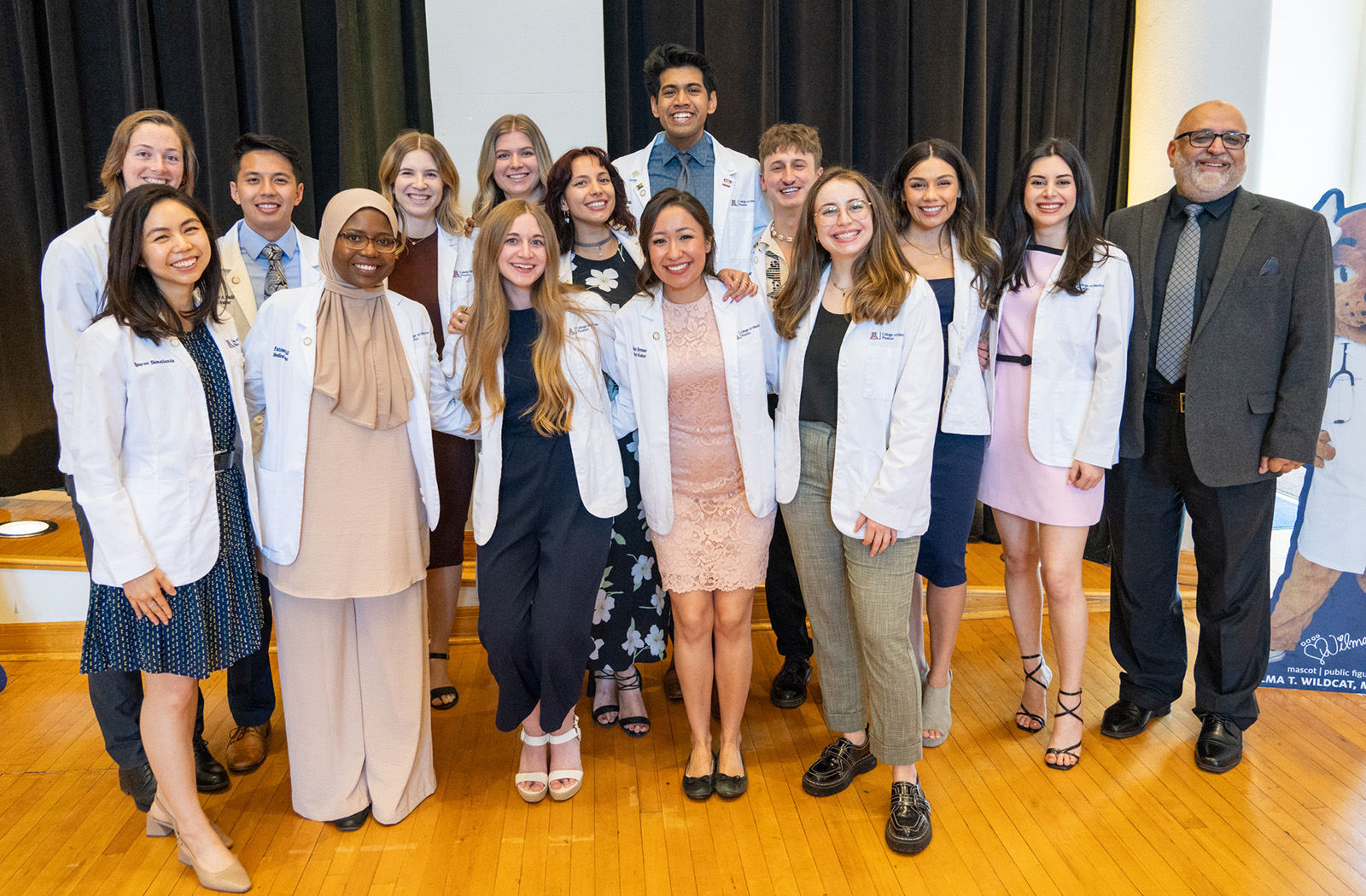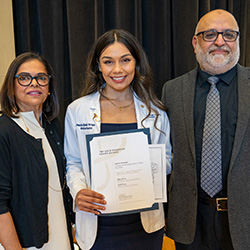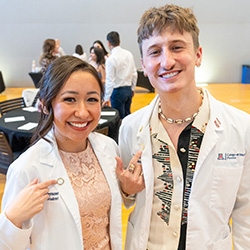
Students, Faculty and Residents from the College Inducted into the Gold Humanism Honor Society

The University of Arizona College of Medicine – Phoenix hosted its annual Gold Humanism Honor Society (GHHS) induction ceremony, honoring students, faculty and residents who exemplify humanism in health care.

Ranita Sharma, MD, executive vice dean of the college, welcomed this year’s inductees into the organization and provided insight and tips on maintaining empathy and compassion for patients.
“We have to try to be in systems that promote compassionate care because if we don’t find compassion, then the joy in our work won’t be there,” Dr. Sharma said. “We have to build trusting relationships with patients, and it’s on us to build that.”
The GHHS is a community of students, residents and faculty dedicated compassionate patient care who serve as role models, mentors and leaders in medicine. Each year, the top 10-15% of third-year medical students are nominated by their peers as exemplars of humanism in medicine.
As they were called one-by-one for the induction ceremony, the inductees tied ribbons around a staff made from yucca stock native to the Arizona desert landscape.
This tradition started with the inaugural GHHS Class of 2011 inductees, and this incoming class tied ribbons to the staff, bounding them with previous generations.
Kareem Raad, MD, an assistant clinical professor for the college’s Department of Family, Community and Preventive Medicine, served as the ceremony’s keynote speaker. He discussed how he learned the importance of community while growing up in both Lebanon and the United States. He emphasized that physicians should look beyond a tribal perspective when providing care.
“We must serve the people who are truly the most in need, not just our tribe,” Dr. Raad said. “This is the power that a humanistic perspective and community of practice can offer us in our work, and I share these thoughts to encourage us to connect with each other.”
Austin Sherwood, one of the medical student inductees, plans on specializing in emergency medicine. He said he was thrilled to find out he was going to be inducted and that humanism is important for practicing medicine.

“I think connecting with the patient on a ground level and not having a power imbalance is very special,” Sherwood said. “Whether it’s simply getting them an extra blanket or having a conversation about how their day is and exploring their emotions, it’s important to meet our patients’ needs.”
For Fatouma Tall, another student inductee, she believes that humanism in medicine means having empathy. Tall, who plans to specialize in obstetrics and gynecology, said it’s important for providers to listen to their patients and check biases before they see them.
“If you see your family members suffering, you suffer with them. And you want to make sure that you are there for them and listening to their problems,” Tall said. “Please listen to your patients and make sure that their loved ones also feel heard.”
Congratulations to the following students:
- Brooke D’Agostini.
- Lauren Dimalanta.
- Jessmin Fernandez.
- Maeliss Gelas.
- Haley Kenner.
- Natalie Nabaty.
- Paulo Peña.
- R. Reichenbach.
- Gillian Reynoso.
- Kendall Schwartz.
- Austin Sherwood.
- Christian Sulit.
- Fatouma Tall.
- Stephen Taylor.
- Jaime Vieira.
- Corinne Winsten.
Faculty members, Peter Nakaji, MD, chair of the Department of Neurosurgery at Banner – University Medical Center Phoenix; Suma Rao, MD, an assistant clinical professor of Child Health; and David Virgil, MD, an assistant clinical professor of Family, Community and Preventive Medicine, were inducted for their work ethic and service as role models to medical students in showcasing humanism in medicine.
The residents who were inducted to the GHHS are Issam Awwad, MD; Kayla Caruso, MD; Taylor Norton, MD; Brittney Bruno, MD; Kristal Hudson, MD and Kristin Nosova, MD.
Photos from the event
About the College
Founded in 2007, the University of Arizona College of Medicine – Phoenix inspires and trains exemplary physicians, scientists and leaders to advance its core missions in education, research, clinical care and service to communities across Arizona. The college’s strength lies in our collaborations and partnerships with clinical affiliates, community organizations and industry sponsors. With our primary affiliate, Banner Health, we are recognized as the premier academic medical center in Phoenix. As an anchor institution of the Phoenix Bioscience Core, the college is home to signature research programs in neurosciences, cardiopulmonary diseases, immunology, informatics and metabolism. These focus areas uniquely position us to drive biomedical research and bolster economic development in the region.
As an urban institution with strong roots in rural and tribal health, the college has graduated more than 1,000 physicians and matriculates 130 students each year. Greater than 60% of matriculating students are from Arizona and many continue training at our GME sponsored residency programs, ultimately pursuing local academic and community-based opportunities. While our traditional four-year program continues to thrive, we will launch our recently approved accelerated three-year medical student curriculum with exclusive focus on primary care. This program is designed to further enhance workforce retention needs across Arizona.
The college has embarked on our strategic plan for 2025 to 2030. Learn more.